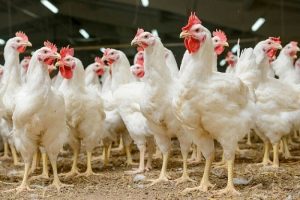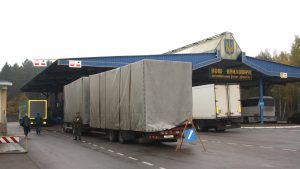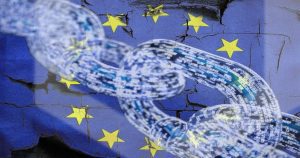
Imports of poultry meat from Ukraine into the EU countries (hereinafter excluding the United Kingdom) decreased in January-November 2020 by 18.1% compared to the same period in 2019, to 100,880 tonnes, however, the country retained the third place among top three exporters in this segment, according to a report on the website of the European Commission with reference to Eurostat.
According to it, in general, imports of these products into the EU for 11 months of 2020 amounted to 479,000 tonnes, which is 14.3% less than in 11 months of 2019.
Among other large exporters, Brazil reduced imports of poultry meat into the EU by 3.9%, to 213,010 tonnes, Thailand by 24.1%, to 124,520 tonnes, and China by 25.7%, to 15,430 tonnes.
Imports of poultry meat from the EU into Ukraine in January-November 2020 amounted to 134,740 tonnes, decreasing compared to the same period in 2019 by the same 18.1%. According to this indicator, Ukraine also ranked third.
In general, exports of these products from the EU decreased by 4%, to 1.590 million tonnes.
According to the report, in 2020, poultry meat production in the EU is expected to decrease by 2%, to 13.23 million tonnes, and consumption by 1.6%, to 12.43 million tonnes. The largest producers are Poland (19%), Spain (13%), France (12%), Germany (12%), Italy (10%) and the Netherlands (8%).
The European Commission said that the United Kingdom in January-September imported 478,660 tonnes of poultry meat, and exported 658,930 tonnes.
As the State Customs Service of Ukraine said, in 2020, exports of poultry meat from Ukraine in quantity terms increased by 4%, to 431,000 tonnes, while in monetary terms it decreased by 4.1%, to $555 million.

The Zhytomyr and Lutsk border detachments each received one Landini 5-120 tractor and one Rinieri TRK 200 branch chopper for a total value of more than EUR 100,000.
According to the press service of the State Border Guard Service of Ukraine, on the eve of the new year, assistance was received from Excelor Holding Group (LLC) as part of the implementation of a joint international technical assistance project with the European Union for provision of equipment for ensuring security and demarcation of the state border between Belarus and Ukraine, vehicles and equipment for border demarcation work.
The technical assistance will be used to carry out demarcation works and engineering arrangement of the Ukrainian-Belarusian section of the border.

DTEK is interested in purchasing new power grid assets in Ukraine and EU countries, CEO of the company Maksym Timchenko has said.
“I believe that all DTEK’s business, in one way or another, are related to how successfully DTEK Grids will develop […] In our long-term strategy, we are talking about expanding the portfolio of assets, we are ready to further participate in the acquisition of grid companies both in Ukraine and beyond,” he said when presenting DTEK’s new strategy until 2030.
As reported, the operating holding DTEK Grids is engaged in the distribution of electricity in Kyiv city, Dnipropetrovsk, Donetsk, Kyiv and Odesa regions.
DTEK was established in 2005 to manage the energy assets of the System Capital Management Group (SCM, Donetsk) of Rinat Akhmetov. The functions of strategic management of the enterprises of the group that make up the vertically integrated chain for the extraction and enrichment of coal, production and sale of electricity were delegated the holding.
ASSETS, DTEK, EU, POWER GRID

The gradual approximation of the regulatory environment and digital development of Ukraine to the level of the European Union as part of integration into the EU Digital Single Market will affect the productivity and economic growth of the country, according to a Tuesday statement on the website of the Ministry of Digital Transformation.
The study entitled “Ukraine’s integration into the EU Digital Single Market: potential economic benefits” was carried out by the Trade+ Center for International Trade Analysis at the Kyiv School of Economics and NGO Ukrainian Center for European Policy and was ordered by the Ministry of Digital Transformation.
The results of the study contain expert assessments and real calculations of the potential profit for the country’s economy from integration into the EU Digital Single Market.
According to the study, the gradual approximation of the regulatory environment and digital development of Ukraine to the EU level within the framework of integration into the EU Digital Single Market will influence bilateral trade: an increase in exports of goods from Ukraine to the EU is expected by 11.8%-17% ($2.4-3.4 billion), services – by 7.6%-12.2% ($302.5-485.5 million).
It will also impact the productivity and economic growth of Ukraine: GDP growth in Ukraine is expected at the level of 2.4-12.1% ($3.1-15.8 billion), the welfare of citizens – by 3.6-7.8%.
It is also expected that the export of goods from the EU to Ukraine will grow by 17.7-21.7% ($4.1-5 billion), and services by 5.7-9.1% to ($191-305 million).
According to the study, an increase in the level of digitalization by 1% will lead to an increase in Ukraine’s GDP by 0.42%.
“Various scenarios of integration into the EU Digital Single Market show that the size of potential benefits will depend on the scale of regulatory and digital transformations in Ukraine. The faster and more efficiently we implement the necessary transformations, the faster we will be able to realize the benefits of integration into the EU Digital Single Market,” Deputy Minister of Digital Transformation for European Integration Valeria Ionan said.
According to the study, the main economic benefits for Ukraine from integration into the EU Digital Single Market are: reduction of transaction and trade costs in trade in goods and services between the EU and Ukraine; growth of business efficiency, economic productivity and GDP of Ukraine; growing well-being of citizens of Ukraine and the EU: better access and lower prices for digital innovative goods and services, consumer protection; development of innovative products and services of digital infrastructure.
In addition, bringing Ukraine’s legislation and standards closer to EU legislation and standards will reduce regulatory differences between Ukraine and the EU in the digital sphere and accelerate Ukraine’s digital development.

Ukraine and ten other countries have joined the EU sanctions against the terrorist organizations ISIS and Al-Qaeda, as well as individuals, groups, enterprises and organizations associated with them, the European Council said.
“The Candidate Countries the Republic of North Macedonia, Montenegro, Serbia and Albania2, the country of the Stabilisation and Association Process and potential candidate Bosnia and Herzegovina, and the EFTA countries Iceland and Liechtenstein, members of the European Economic Area, as well as Ukraine, the Republic of Moldova, Armenia and Georgia align themselves with this Council Decision,” the European Council said on its website on Thursday.
It is noted that these countries will ensure that their national policies conform to these Council Decisions.
“The European Union takes note of this commitment and welcomes it,” the message reads.
On 19 October 2020, the Council adopted Decision (CFSP) 2020/15161. The Council Decision extends the existing restrictive measures until 31 October 2021.

The EU intends to provide Ukraine with EUR 20 million of financial support for the digital transformation development, Deputy Prime Minister, Minister of Digital Transformation Mykhailo Fedorov said.
“EUR 9.6 million is the first financial contribution that Ukraine will receive under the EU4DigitalUA project. The Estonia’s e-Governance Academy and the Spanish foundation FIIAPP Spain will help in the implementation of projects on electronic services, cybersecurity, data protection, and the development of registries,” Fedorov wrote on the Facebook.
He wrote that funding will also cover: development of infrastructure for electronic government; modernization of public e-services and development of services on the Diia (Action) portal and in the Dia app; visualization of information about access to broadband Internet in Ukraine; further connection of the main registers to the Trembita data exchange system; development of a national personal identifier, a state digital identity card and a register registration addresses of citizens; development of trust services.
“Support of digitalization in Ukraine is at the same time support of all key reforms and anti-corruption. The country will receive more qualitative changes. We are grateful to the EU for their trust and we act together,” Fedorov wrote.